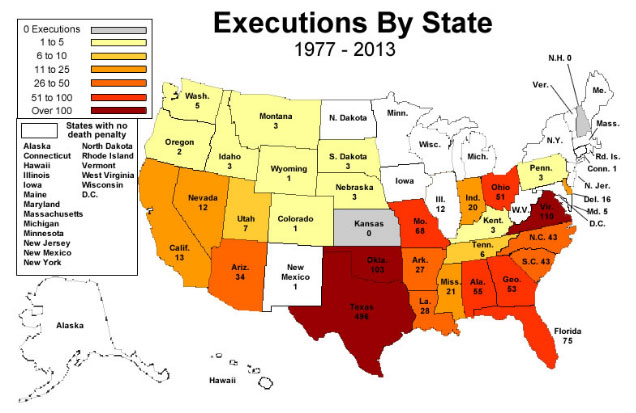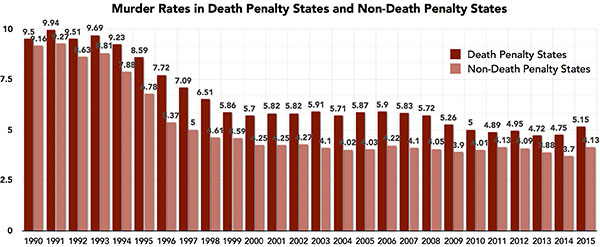Houston criminal defense attorney Neal Davis explains how the death penalty works in Texas, its history, and what to do if you’ve been charged with a capital offense.
Being convicted of a serious violent crime in Texas can be a life-threatening event.
The Lone Star State is notorious for coming down especially harsh on capital crimes such as homicide and murder.
In fact, Texas has executed more prisoners since 1976 than any other state in the country, with over 540 offenders receiving capital punishment sentencing – more than a third of the national total. Harris County alone has been responsible for over 280 death sentences and 116 executions since 1982.

If you’ve been charged with a capital offense in Texas, don’t leave your case up to chance.
Let our Houston criminal defense lawyers at the Neal Davis Law Firm show you how we’ll fight for your freedom and life.
Schedule an AppointmentWhat is capital punishment?
Capital punishment, also referred to as the “death penalty,” is defined as the legally authorized “execution of an offender sentenced to death after conviction by a court of law of a criminal offense.” The death penalty is considered the ultimate punishment for committing a serious crime, typically involving murder or the purposefully killing of another person. Capital punishment is not the same as extrajudicial executions carried out without due process of the law.
What crimes are punishable by death in Texas?
According to Texas death penalty statutes, murder or homicide is only considered a capital offense and eligible for the death penalty if it meets one of the following requirements:
- The victim was a police officer, fireman or person acting in the lawful discharge of an official responsibility
- The murder occurred while the defendant was committing or attempting to commit burglary, robbery, kidnapping, aggravated sexual assault, arson, obstruction or an act of terrorism
- The murder was paid for (both the hirer and the person hired)
- The death occurred during an actual or attempted prison break
- The victim was killed while working at a penal institution
- The defendant committed murder while in prison for a previous murder conviction, or while serving a sentence of life imprisonment or a term of 99 years for aggravated kidnapping, aggravated sexual assault or aggravated robbery
- Multiple people were killed due to the defendant’s actions
- The victim was younger than 10 years old
- The murder was in retaliation to a ruling by a judge or justice of the supreme court, the court of criminal appeals, a court of appeals, a district court, a criminal district court, a constitutional county court, a statutory county court, a justice court, or a municipal court
The state of Texas also practices the Law of Parties, which means people can be sentenced to death if they were present while a capital crime was committed due to the offender being “criminally responsible for the conduct of another.”
A brief history of the death penalty in Texas
The death penalty has been used as a form of capital punishment since ancient times, as discovered in the Code of Hammurabi. Murder, rape, treason and arson were punishable by death in Ancient Greece and Rome. This ancient legal philosophy of lex talionis (“an eye for an eye, tooth for a tooth, and life for a life”) spread through Western Europe and continued throughout the Middle Ages and into modern times. Today, the death penalty remains a highly controversial part of the American criminal justice system used to justify capital punishment in certain states.
The first recorded execution in Texas occurred in 1819 when an accused pirate by the name of George Brown was hung to death. In 1840, Henry Forbes, an African American, received the death penalty for breaking out of jail. In total, Texas carried out eight capital punishment executions before gaining statehood in 1846. For the next 80 years or so, Texas carried out the death penalty by hanging in most cases. In 1923, the state changed its death penalty law so that capital punishments were done via electric chair.

Map courtesy of DeathPenaltyInfo.org
In 1972, the Supreme Court made an historic ruling in the case of Furman v. Georgia, declaring that the “unitary” trial process (when a jury was asked to give their verdict of a defendant’s guilt or innocence and, simultaneously, sentence the defendant to life imprisonment or the death penalty) was unconstitutional under the Eighth Amendment’s prohibition against “cruel and unusual punishment.” This decision essentially brought into question all death penalty sentences in Texas and nationwide.
The Supreme Court has since set down a new “bifurcated” trial process (where the trial and sentencing stages are separate) and detailed constitutional requirements for sentencing a defendant to death. These new standards strictly limit the legal definition of capital murder to which the death penalty may be applied and makes capital punishment unconstitutional unless the jury is able to appropriately consider mitigating and aggravating factors – such as a defendant’s background, record, character and circumstances of the crime – to make an individualized decision about whether death would be appropriate.
Just four years later, in 1976, the Supreme Court once again permitted capital punishment to be imposed in the case of Gregg v. Georgia, and a companion case in Texas was upheld by the Court. The first state-sanctioned execution following this ruling did not occur until 1982, when Texas became the first governmental jurisdiction in the world to carry out a death penalty execution by lethal injection. The man executed, Charles Brooks, Jr., was also the first African American to receive the death penalty in the United States since 1967.
From then until now, the state of Texas has executed over 540 people, including nine women.
The Supreme Court has also since ruled that the death penalty is unconstitutional when applied to minors and people with developmental disabilities; however, the Texas government has yet to set appropriate standards and procedures in cases involving defendants with mental retardation.
Does the death penalty deter crime in Texas?
There is conflicting statistical evidence that capital punishment deters would-be future criminals. According to many sources, the deterrent effect has clearly been proven false. This side argues that the murder rate in non-death penalty states has remained consistently lower than the rate in states with the death penalty, and the gap has grown since 1990.
On the other side, some experts claim they have found strong evidence to support a deterrent effect between capital punishment and murder rates.

Chart courtesy of DeathPenaltyInfo.org
Capital punishment in Texas: Pros and cons
The death penalty is a hotly debated and controversial issue not just in Texas, but nationwide. Proponents argue that capital punishment is an appropriate penalty for particularly atrocious crimes, while those against assert that the death penalty is unconstitutional and immoral. This raging debate will undoubtedly continue to escalate in the coming years as the courts, media and public deliberate on the following points:
Arguments FOR the death penalty:
- The threat of capital punishment deters future criminals.
- The death penalty is appropriate justice for a particularly heinous act.
- The defendant will never be able to escape or commit a crime again, making society safer.
- The death penalty provides closure for the victim’s family and loved ones.
- Capital punishment is less of a financial burden to society than the ongoing cost of life imprisonment.
Arguments AGAINST the death penalty:
- Statistics indicate that the death penalty does not meaningfully affect murder rates, meaning it may not be a deterrent.
- Death is an excessively harsh punishment; life imprisonment without parole is sufficient.
- Death is final and cannot be reversed, even if future evidence exonerates the defendant. Wrongful executions have occurred in a number of high-profile cases in Texas history, including Claude Jones, Cameron Todd Willington, Ruben Cantu, David Spence, & Carlos de Luna
- The act of killing a criminal defendant is itself a violent and evil act.
- The problem of racial bias in the American criminal justice system makes capital punishment unfairly targeted towards the non-white population.
Regardless of where you stand on the issue of capital punishment, most people can agree that everyone deserves the right to a fair trial and due process of law under the U.S. Constitution. At the Neal Davis Law Firm, we’ve taken this job seriously for over 25 years.
“Mr. Davis was referred to me by someone who has often seen Mr. Davis at work.From the beginning Mr. Davis was no-nonsense and straight forward. He got to work right away and kept me informed of whatever developments came about.His reputation, professionalism and tenacity gave me confidence for a positive outcome.At the end my case was dismissed. If I or someone I cared about were to be in need of criminal defense in the future Mr. Davis would definitely be my first call. -Avvo Review 2015”
Houston | Criminal Defense case
Verified Customer
A Houston criminal defense law firm focusing on capital punishment cases
The Neal Davis Law Firm, based in Houston, Texas, handles serious violent crime cases across the state and nation. After more than a decade practicing law with legendary criminal defense lawyer Dick DeGuerin, Neal Davis founded his firm to fight for clients from all walks of life in state and federal courts—including the Texas Court of Appeals and the U.S. Supreme Court.
If you or a loved one face a capital offense charge that could lead to the death penalty, it’s imperative that you enlist help from an experienced criminal defense attorney as soon as possible. The stakes couldn’t be higher, which is why you need to hire a defense lawyer who knows how best to defend your constitutional rights, stand by your side and provide the most skilled representation every step of the way.
Contact Houston defense attorney Neal Davis today to schedule an appointment.






